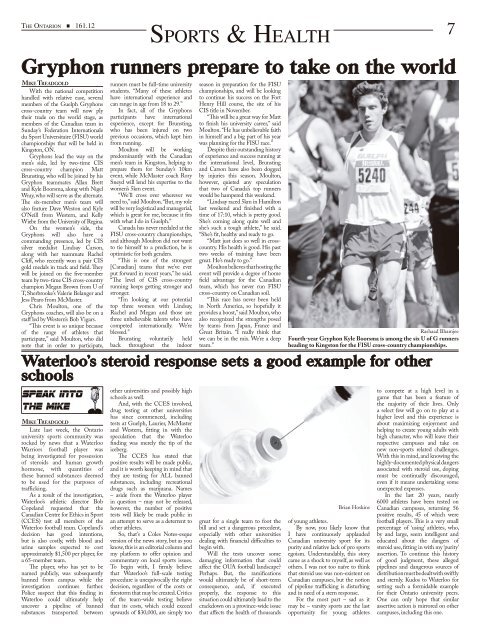No - The Ontarion
No - The Ontarion
No - The Ontarion
You also want an ePaper? Increase the reach of your titles
YUMPU automatically turns print PDFs into web optimized ePapers that Google loves.
THE ONTARION 161.12SPORTS & HEALTHGryphon runners prepare to take on the worldMIKE TREADGOLDWith the national competitionhandled with relative ease, severalmembers of the Guelph Gryphonscross-country team will now plytheir trade on the world stage, asmembers of the Canadian team inSunday’s Federation Internationaledu Sport Universitaire (FISU) worldchampionships that will be held inKingston, ON.Gryphons lead the way on themen’s side, led by two-time CIScross-country champion MattBrunsting, who will be joined by hisGryphon teammates Allan Brettand Kyle Boorsma, along with NigelWray, who will serve as the alternate.<strong>The</strong> six-member men’s team willalso feature Dave Weston and KyleO’Neill from Western, and KellyWiebe from the University of Regina.On the women’s side, theGryphons will also have acommanding presence, led by CISsilver medalist Lindsay Carson,along with her teammate RachelCliff, who recently won a pair CISgold medals in track and field. <strong>The</strong>ywill be joined on the five-memberteam by two-time CIS cross-countrychampion Megan Brown from U ofT, Sherbrooke’s Valerie Belanger andJess Pearo from McMaster.Chris Moulton, one of theGryphons coaches, will also be on astaff led by Western’s Bob Vigars.“This event is so unique becauseof the range of athletes thatparticipate,” said Moulton, who didnote that in order to participate,runners must be full-time universitystudents. “Many of these athleteshave international experience andcan range in age from 18 to 29.”In fact, all of the Gryphonsparticipants have internationalexperience, except for Brunsting,who has been injured on twoprevious occasions, which kept himfrom running.Moulton will be workingpredominantly with the Canadianmen’s team in Kingston, helping toprepare them for Sunday’s 10kmevent, while McMaster coach RorySneyd will lend his expertise to thewomen’s 5km event.“We’ll cross over wherever weneed to,” said Moulton. “But, my rolewill be very logistical and managerial,which is great for me, because it fitswith what I do in Guelph.”Canada has never medaled at theFISU cross-country championships,and although Moulton did not wantto tie himself to a prediction, he isoptimistic for both genders.“This is one of the strongest[Canadian] teams that we’ve everput forward in recent years,” he said.“<strong>The</strong> level of CIS cross-countryrunning keeps getting stronger andstronger.“I’m looking at our potentialtop three women with Lindsay,Rachel and Megan and those arethree unbelievable talents who havecompeted internationally. We’reblessed.”Brunsting voluntarily heldback throughout the indoorseason in preparation for the FISUchampionships, and will be lookingto continue his success on the FortHenry Hill course, the site of hisCIS title in <strong>No</strong>vember.“This will be a great way for Mattto finish his university career,” saidMoulton. “He has unbelievable faithin himself and a big part of his yearwas planning for the FISU race.”Despite their outstanding historyof experience and success running atthe international level, Brunstingand Carson have also been doggedby injuries this season. Moulton,however, quieted any speculationthat two of Canada’s top runnerswould be hampered this weekend.“Lindsay raced 5km in Hamiltonlast weekend and finished with atime of 17:10, which is pretty good.She’s coming along quite well andshe’s such a tough athlete,” he said.“She’s fit, healthy and ready to go.“Matt just does so well in crosscountry.His health is good. His pasttwo weeks of training have beengreat. He’s ready to go.”Moulton believes that hosting theevent will provide a degree of homefield advantage for the Canadianteam, which has never run FISUcross-country on Canadian soil.“This race has never been heldin <strong>No</strong>rth America, so hopefully itprovides a boost,” said Moulton, whoalso recognized the strengths posedby teams from Japan, France andGreat Britain. “I really think thatwe can be in the mix. We’re a deepteam.”Waterloo’s steroid response sets a good example for otherschools<strong>Ontarion</strong>MIKE TREADGOLDLate last week, the Ontariouniversity sports community wasrocked by news that a WaterlooWarriors football player wasbeing investigated for possessionof steroids and human growthhormone, with quantities ofthese banned substances deemedto be used for the purposes oftrafficking.As a result of the investigation,Waterloo’s athletic director BobCopeland requested that theCanadian Centre for Ethics in Sport(CCES) test all members of theWaterloo football team. Copeland’sdecision has good intentions,but is also costly, with blood andurine samples expected to costapproximately $1,500 per player, fora 65-member team.<strong>The</strong> player, who has yet to benamed publicly, was subsequentlybanned from campus while theinvestigation continues further.Police suspect that this finding inWaterloo could ultimately helpuncover a pipeline of bannedsubstances transported betweenother universities and possibly highschools as well.And, with the CCES involved,drug testing at other universitieshas since commenced, includingtests at Guelph, Laurier, McMasterand Western, fitting in with thespeculation that the Waterloofinding was merely the tip of theiceberg.<strong>The</strong> CCES has stated thatpositive results will be made public,and it is worth keeping in mind thatthey are testing for ALL bannedsubstances, including recreationaldrugs such as marijuana. Names– aside from the Waterloo playerin question – may not be released,however, the number of positivetests will likely be made public inan attempt to serve as a deterrent toother athletes.So, that’s a Coles <strong>No</strong>tes-esqueversion of the news story, but as youknow, this is an editorial column andmy platform to offer opinion andcommentary on local sports issues.To begin with, I firmly believethat Waterloo’s full-scale testingprocedure is unequivocally the rightdecision, regardless of the costs orfirestorm that may be created. Criticsof the team-wide testing believethat its costs, which could exceedupwards of $30,000, are simply toogreat for a single team to foot thebill and set a dangerous precedent,especially with other universitiesdealing with financial difficulties tobegin with.Will the tests uncover somedamaging information that couldaffect the OUA football landscape?Perhaps. But, the ramificationswould ultimately be of short-termconsequence, and, if executedproperly, the response to thissituation could ultimately lead to thecrackdown on a province-wide issuethat affects the health of thousandsof young athletes.By now, you likely know thatI have continuously applaudedCanadian university sport for itspurity and relative lack of pro sportsegoism. Understandably, this storycame as a shock to myself, as well asothers. I was not too naïve to thinkthat steroid use was non-existent onCanadian campuses, but the notionof pipeline trafficking is disturbingand in need of a stern response.For the most part – sad as itmay be – varsity sports are the lastopportunity for young athletes7Rashaad BhamjeeFourth-year Gryphon Kyle Boorsma is among the six U of G runnersheading to Kingston for the FISU cross-country championships.Brian Hoskinsto compete at a high level in agame that has been a feature ofthe majority of their lives. Onlya select few will go on to play at ahigher level and this experience isabout maximizing enjoyment andhelping to create young adults withhigh character, who will leave theirrespective campuses and take onnew non-sports related challenges.With this in mind, and knowing thehighly-documented physical dangersassociated with steroid use, dopingmust be continually discouraged,even if it means undertaking someunexpected expenses.In the last 20 years, nearly6000 athletes have been tested onCanadian campuses, returning 56positive results, 45 of which werefootball players. This is a very smallpercentage of ‘using’ athletes, who,by and large, seem intelligent andeducated about the dangers ofsteroid use, fitting in with my ‘purity’assertion. To continue this historyof good judgment, these allegedpipelines and dangerous sources ofdistribution must be dealt with swiftlyand sternly. Kudos to Waterloo forsetting such a formidable examplefor their Ontario university peers.One can only hope that similarassertive action is mirrored on othercampuses, including this one.





